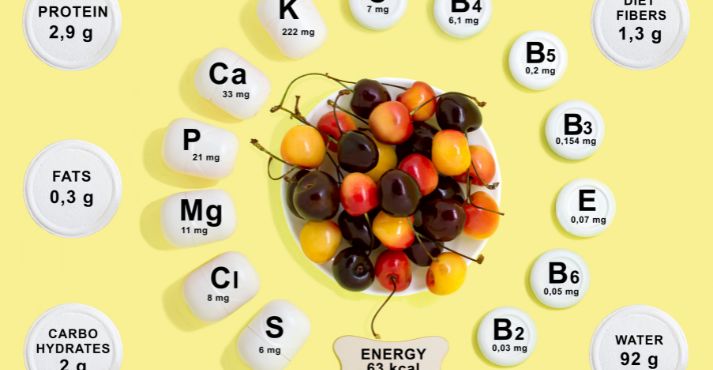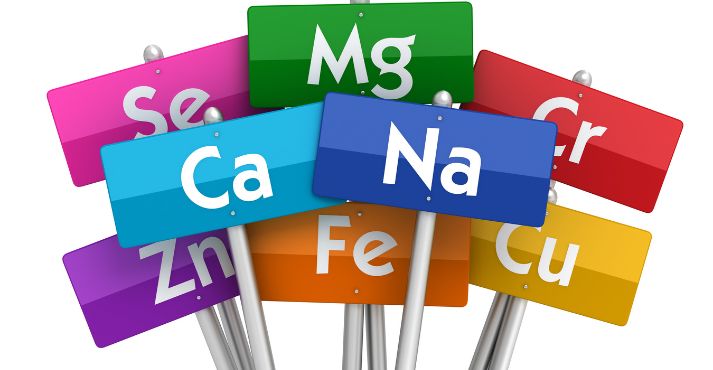In understanding minerals in food, we uncover their vital role in supporting overall health and well-being.
These essential nutrients are the champions behind various physiological functions, underscoring the importance of incorporating a diverse range of minerals into our daily diets.
As we delve into this exploration, we appreciate minerals’ fundamental role in nurturing our bodies for optimal functioning.
Types of Dietary Minerals
Macro Minerals
Let’s discuss the big players in your diet – the macro minerals. These are the essential building blocks your body needs for overall health. We’ll keep it simple and explore why calcium, potassium, and magnesium are superheroes of your well-being.
Why Calcium Matters:
Calcium serves as a crucial element in fortifying bone health and integrity. It’s not just about building strong bones in your younger days – it’s about keeping them challenging as you go through life. So, make sure to include calcium-rich foods for sturdy and resilient bones.
Potassium’s Role in Fluid Balance:
Potassium plays a vital role in keeping the balance of fluids in your body in check. It’s like the maestro of a symphony, ensuring everything flows smoothly. Having enough potassium from good food sources keeps your blood pressure stable and your heart healthy.
Magnesium and Your Muscles:
Magnesium stands out as a significant contributor among essential macro minerals. It functions as the behind-the-scenes coordinator for your muscles, ensuring optimal performance.
From flexing to relaxing, magnesium keeps the show going. Include foods with magnesium for a happy and healthy muscle crew.
Understanding Macro Minerals in Your Food:
They transcend their role as mere nutrients, serving as indispensable contributors to the seamless functioning of the body. So, enjoy a variety of foods that bring these macro minerals to your table – it’s your body’s way of saying thanks!
Trace Minerals
Now, let’s shine a light on– the trace minerals. Though needed in smaller amounts, their impact on well-being is substantial. Iron, zinc, and copper are essential for various physiological processes.
What Iron Does:
Picture iron as the carrier of life’s breath – oxygen. Iron plays a critical part in oxygen transport, as it ensures every cell in the body receives the oxygen it requires to function optimally. Iron ensures this vital element’s seamless delivery from toe to head.
Zinc’s Immune Support:
Regard zinc as the unheralded champion reinforcing the immune system. It enables immune cells to operate efficiently, standing sentinel against potential threats. Including zinc-rich foods provides the backing the immune system needs.
How Copper Shields:
Copper plays a pivotal role in the body’s defense against oxidative stress. It acts like armor, safeguarding cells. Integrating copper into the diet is akin to providing cells with protective reinforcement.
Roles of Iron, Zinc, and Copper in Health:
In this exploration of trace minerals, we’ve encountered iron, zinc, and copper – unassuming yet influential contributors. Despite their minimal presence, their significance in oxygen transport, immune function, and antioxidant defense is profound.
Food Sources of Minerals
Building Strong Bones with Calcium-Rich Foods
Let’s explore the essentials for maintaining robust bones—calcium-rich foods. Dive into a world of dietary goodness that fosters strong teeth and skeletal health.
Milk and Yogurt:
Harness the power of calcium with the simplicity of milk and yogurt. These everyday delights offer a tasty and effective solution for bone health.
Kale and Broccoli:
For those who avoid dairy, consider turning to nature’s green nutritional champions, such as kale and broccoli. They provide ample calcium without a dairy footprint.
Orange Juice and Tofu:
Explore diverse sources like fortified orange juice and tofu. They offer a calcium boost, each with its unique flavor profile.
Incorporating Calcium into Your Diet:
Celebrate the versatility of calcium sources. Whether it’s the classic dairy or plant-based milk alternatives, these choices empower your bones for a resilient and healthy life.
Nourishing Balance with Potassium-Rich Foods
Embark on a nutrient-rich journey as we unravel the importance of potassium. Discover how these foods contribute to maintaining a delicate equilibrium in your body, from bananas to potatoes.
Bananas:
Nature’s portable snack, bananas, pack a potassium punch. Enjoy them on the go to keep your potassium levels in check.
Oranges:
The vibrant citrusy goodness of oranges isn’t just refreshing—it’s a potassium powerhouse, supporting nerve function and muscle health.
Potatoes:
From mashed to baked, potatoes offer versatility and a healthy dose of potassium. They’re a culinary canvas for a nutrient-rich meal.
Balancing Nutrient Intake:
Potassium-rich foods aren’t just flavorsome; they are vital in maintaining fluid balance in the body, supporting nerve function, and facilitating muscle contraction. Incorporate these gems into your diet for a balanced nutritional journey.
Elevating Vitality with Iron-Rich Choices
Delve into iron-rich foods, where the simplest dietary choices can boost your vitality and well-being. Let’s uncover the significance of iron in oxygen transport, energy production, and immune support.
Lean Meats:
Savor the goodness of lean meats as they provide high-quality protein and a rich source of iron, contributing to optimal oxygen transport in your body.
Beans:
From kidney beans to chickpeas, legumes offer a plant-based iron source. Incorporate them into your meals for a nutrient-packed and iron-boosting feast.
Spinach:
This leafy green isn’t just a salad star; it’s a nutritional powerhouse. Packed with iron, spinach supports your body in oxygen transport and enhances energy production.
Boosting Iron Levels:
Iron-rich foods are vital in ensuring your body’s oxygen transport, energy production, and immune function. Choose wisely to elevate your vitality and embrace a healthier lifestyle.
Dietary Considerations and Absorption
Factors Affecting Mineral Absorption
Discover the vital factors influencing how your body absorbs minerals. Let’s delve into the basics—your daily food choices, how minerals become available, and the interplay between different nutrients.
It’s all about creating a balanced diet that ensures your body gets the minerals to stay healthy.
Dietary Choices:
Choosing a variety of foods means you’re setting the stage for good mineral absorption. A mix of nutrients in your meals is like providing your body with a toolkit for better mineral absorption.
Bioavailability:
Think of bioavailability as the efficiency of your body in grabbing those minerals. Some foods help your body absorb minerals better, while others might slow the process.
Nutrient Interactions:
In the world of nutrients, they interact in different ways. Some buddies team up to boost absorption, while others might have a little competition. Knowing this helps you make more intelligent choices for the best mineral absorption.
Maximizing Mineral Absorption:
Getting the most out of minerals means making thoughtful food choices, considering bioavailability, and understanding how different nutrients play together. It’s about keeping your diet balanced to ensure your body can absorb minerals like a well-tuned orchestra.
Vegetarian and Vegan Diets

For those choosing vegetarian or vegan paths, understanding mineral sources is vital. Let’s explore how to obtain essential minerals from plant-based foods and discuss supplementation when necessary.
Embracing Vegetarian Diets:
- Diverse Green Goodies: Leafy greens like spinach and kale are rich in calcium and magnesium. Incorporate them creatively into your meals for a nutrient boost.
- Beans and Legumes: Packed with iron and zinc, beans and legumes are versatile additions to salads, stews, and wraps. Explore various types for a flavorful experience.
Navigating Vegan Diets:
- Fruitful Choices: Fruits like bananas and oranges are potassium-packed delights. Enjoy them as snacks, or add them to smoothies for a tasty potassium infusion.
- The Power of Nuts and Seeds: Almonds and sunflower seeds are treasure troves of essential minerals. Snack on them or sprinkle over salads to enhance your mineral intake.
Plant-Powered Mineral Choices:
- Broccoli Brilliance: Broccoli is a vitamin powerhouse and a great source of calcium. Include it in stir-fries or enjoy it steamed for a nutrient-rich meal.
- Quinoa Quest: Quinoa is considered one of the best plant-based protein foods and a fantastic iron source. Use it as a base for bowls, salads, or even in place of rice.
Guidance for Nutrient Sufficiency:
- Balanced Combinations: Combine different plant-based foods to create well-rounded meals. This ensures you receive a variety of minerals.
- Smart Supplementation: Consider supplements for minerals like B12, especially for a vegan diet. Consult a nutrition expert for personalized advice.
Meeting Mineral Needs:
The first step is understanding the role of plant-based foods in providing essential minerals. Dive into a world of delicious, nutritious choices, and make your vegetarian or vegan journey a nourishing success.
Health Implications of Mineral Deficiencies and Excess
Consequences of Mineral Deficiencies
Our bodies lack essential minerals, which can lead to various health challenges. Let’s delve into the consequences of mineral deficiencies and how they can affect our well-being.
Deficiency Dilemmas:
- Osteoporosis Ouch: Inadequate calcium intake may contribute to osteoporosis, weakening bones and making them more prone to fractures. Include calcium-rich foods in your diet for bone health.
- Anemia Ailments: Low iron levels can lead to anemia, causing fatigue and weakness. Incorporate iron-rich foods like leafy greens and legumes to boost your iron intake.
- Muscle Cramps Misery: Insufficient potassium, magnesium, or calcium can result in muscle cramps. Ensure a balanced diet with bananas, nuts, and dairy to prevent cramping.
Recognizing Symptoms:
- Bone Health Signals: Watch for signs like brittle nails and frequent fractures, indicating potential calcium deficiencies.
- Fatigue Flags: Persistent tiredness and paleness might indicate iron-deficiency anemia. Consult a healthcare professional for proper diagnosis and guidance.
- Cramp Cues: Recurrent muscle cramps may be a signal of mineral imbalance. Adjust your diet to include a variety of mineral-rich foods.
Prevention Through Nutrition:
- Balanced Diet Blueprint: Build a diet with a spectrum of mineral-rich foods to ensure you get a mix of essential nutrients.
- Supplementation Strategy: In consultation with a healthcare provider, consider supplements if dietary adjustments alone aren’t sufficient.
Defending Your Health:
Understanding the consequences of mineral deficiencies empowers you to make informed choices. Let’s weave a health tapestry by nourishing our bodies with the necessary minerals.
Risks of Excessive Mineral Intake
While minerals are crucial for health, we must explore the potential risks when we tip the scales toward excess intake. Let’s unravel the risks and understand the importance of moderation.
The Dangers of Excess:
- Calcium Conundrum: Too much calcium can lead to kidney stones and interfere with the absorption of other minerals. Strike a balance for bone health without excess.
- Iron Overload: Excessive iron intake, often from supplements, may cause nausea, vomiting, and even organ damage. Get your iron from diverse food sources, and consult a professional if you consider supplements.
- Sodium Struggles: High sodium intake is linked to hypertension and heart issues. Be mindful of processed foods, a common source of excessive sodium.
The Art of Moderation:
- Diverse Dietary Palette: Opt for various foods to ensure a broad mineral intake without relying heavily on specific sources.
- Consult with Care: Before embracing mineral supplements, seek guidance from a healthcare professional to avoid unintentional excess.
Striking a Balanced Tune:
- Whole-Food Wisdom: Choose whole, unprocessed foods to regulate mineral intake naturally. Fruits, vegetables, and whole grains offer a nutrient-rich balance.
- Mindful Consumption: Read food labels and be mindful of added minerals in processed foods. Aim for a diet that mirrors nature’s symphony of nutrients.
Dietary Guidelines for Mineral Intake
Recommended Dietary Allowances (RDAs)
Let’s understand the compass guiding our nutritional choices—Recommended Dietary Allowances (RDAs) for minerals. We will explore the optimal levels that steer us toward healthful living.
RDAs: The North Star of Nutrition
- Defining RDAs: Recommended Dietary Allowances (RDAs) are science-backed guidelines indicating the average daily intake necessary to meet the nutritional needs of most individuals.
- Tailored to You: RDAs consider factors like age, sex, and life stage, providing personalized guidance for diverse nutritional requirements.
Mineral Roadmap: Following the Guidelines
- Calcium Cruise: RDAs for calcium vary with age, emphasizing the importance of strong bones and teeth.
- Potassium Pathway: Navigate the RDA for potassium to maintain fluid balance, nerve function, and muscle health.
- Iron Exploration: Uncover the RDAs for iron, which is vital for oxygen transport, energy production, and immune support.
Tips for a Healthful Journey
- Diverse Diets: Embrace a diverse diet to meet RDA guidelines naturally. Include fruits, vegetables, lean meats, and whole grains.
- Consult the Compass: Seek guidance from healthcare professionals to align your diet with your unique needs, ensuring you meet RDAs without excess.
The Takeaway: A Healthful Horizon
Understanding RDAs for minerals is like having a reliable map for a nutritional expedition. Let’s chart a course that ensures our diets align with these guidelines, paving the way for a healthier tomorrow.
Balanced Diets for Mineral Health
Let’s understand the importance of balanced diets in maintaining optimal health through essential minerals.
The Balance of Nutrient Diversity
- Essential Mix: A balanced diet combines various foods to meet your body’s mineral needs.
- Diverse Nutrition: Ensure a variety of nutrient-rich foods, from vegetables to lean proteins, to meet daily mineral requirements.
Key Players in Nutrient Harmony
- Vitamins and Minerals: Discover the synergy between vitamins and minerals with a balanced diet.
- Hydration Support: Water aids in mineral transport and absorption.
Practical Tips for Nutrient-Rich Eating
- Colorful Palette: Embrace a spectrum of colors on your plate, each bringing a unique set of minerals.
- Whole Foods Focus: Opt for whole, unprocessed foods for a natural mineral boost.
Your Nutritional Strategy
A balanced diet is crucial for overall health, ensuring a variety of nutrients for a well-rounded nutritional intake.
Conclusion
In wrapping up our exploration of minerals in food, we acknowledge their indispensable role in maintaining optimal health. Nurturing our bodies through balanced nutrition is crucial in accessing these vital elements.
As we reflect on dietary minerals, it becomes evident that thoughtful consideration of sources and a commitment to balanced nutrition contribute significantly to overall wellness.
Concluding thoughts on minerals in food underscore the importance of making informed dietary choices for a healthier and more vibrant life.
















